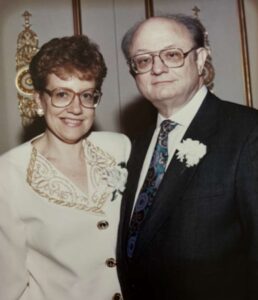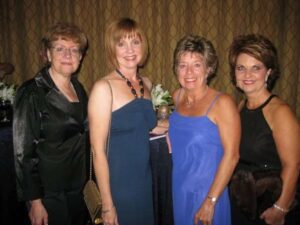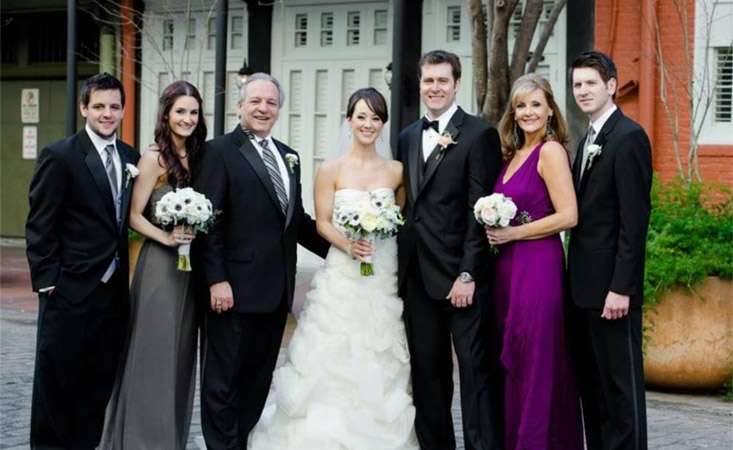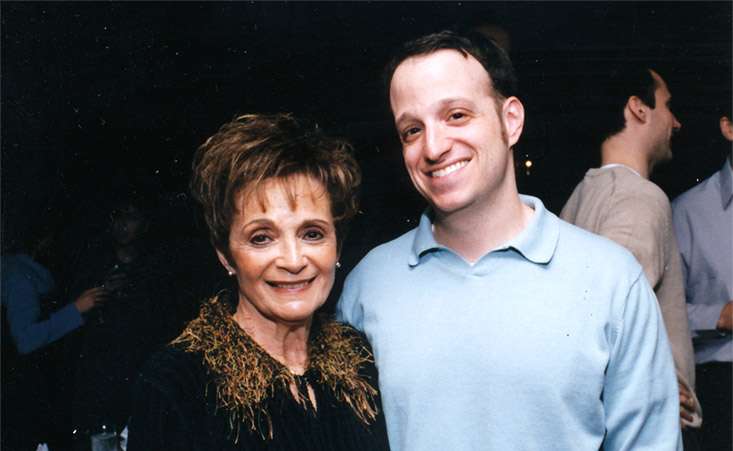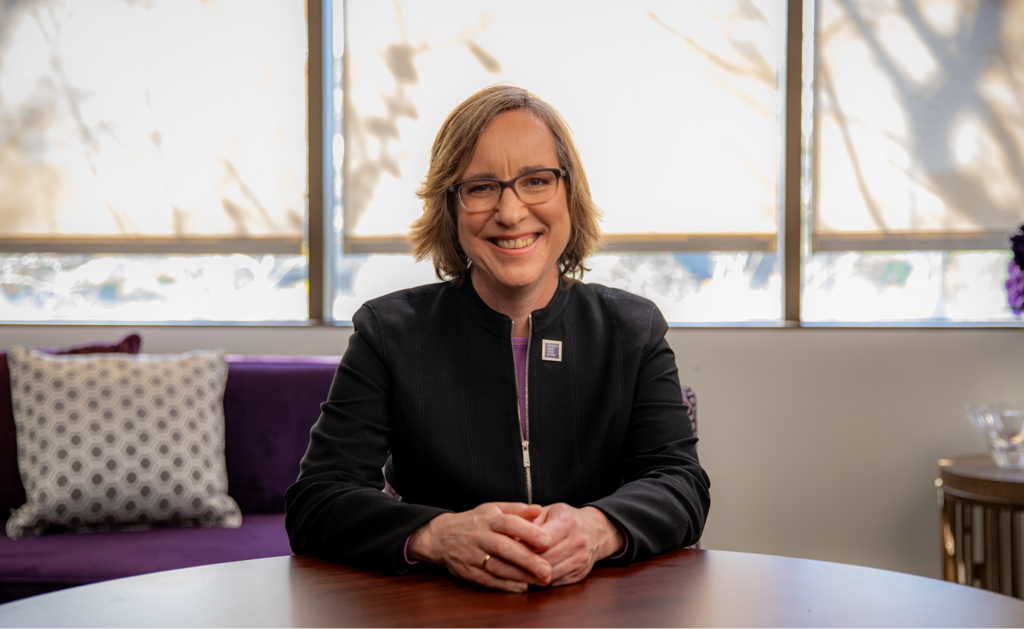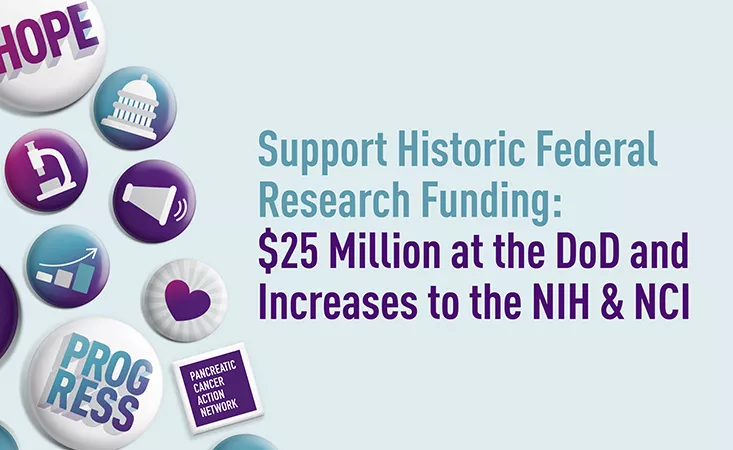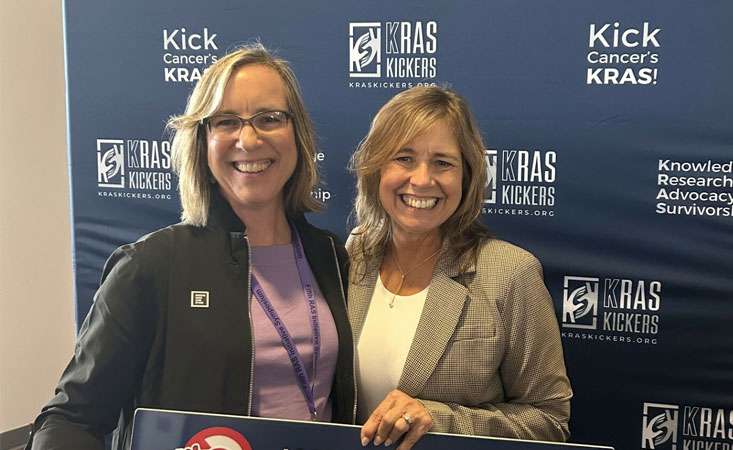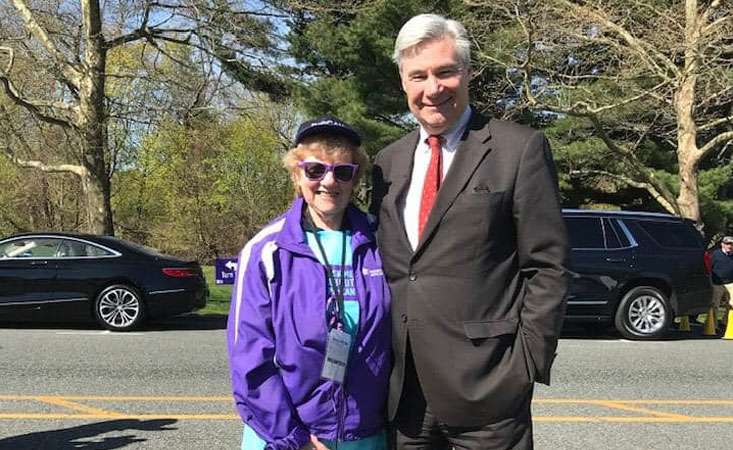
Marilyn Myrow with Sen. Sheldon Whitehouse (RI) at PanCAN PurpleStride Rhode Island 2024.
Allan Jay Myrow was always happy to help a neighbor, friend or even a stranger. If someone needed a ride to the supermarket, he’d happily pick them up. If family asked for a hand, he was there in a flash to pitch in.
His wife, Marilyn, was a helper and a doer alongside Allan. She remains a doer to this day for PanCAN – as a donor, advocate, PanCAN PurpleStride fundraiser and a longtime volunteer in PanCAN’s Rhode Island Affiliate.
When Allan was diagnosed with pancreatic cancer in 1990, PanCAN did not yet exist. After his death nine years later, PanCAN – newly formed as the organization where pancreatic cancer patients and loved ones could find information, resources and hope – was where Marilyn turned to not for support, but to give support.
“I felt like I needed to advocate for more awareness and funding for the disease,” she said. “One day I was watching the local news and a woman from Providence was talking about PanCAN. She said she was looking for people to get involved locally. I gave her a call, we met for dinner, and I’ve been involved ever since.”
Marilyn hasn’t missed a beat. She is the longest-serving volunteer in the Rhode Island Affiliate. She also has made an annual donation to PanCAN every single year since it was founded in 1999.
“I feel strongly that if I can’t spend money to honor the most important person in my life, all the money in the world means nothing,” she said.
Allan and Marilyn were married 29 years.
“He was a wonderful person,” Marilyn said. “He worked in the computer field and was on the cutting-edge of technology. He was very smart. I know I’m bragging … but he was!”
One night after dinner out, Marilyn remembers, Allan had felt ill. He was so sick he couldn’t lie down, sit or stand, and he was in terrible pain. The next morning, an ultrasound revealed a mass on Allan’s pancreas. He was quickly referred to a top surgeon near their home and had the Whipple surgery to remove the tumor. Although Allan had complications post-surgery, he didn’t need further treatment for cancer at the time. But eight-and-a-half years later, pancreatic cancer was back. Allan met with an oncologist and started chemotherapy but unfortunately, it was not effective.
After Allan’s death in 1999, and Marilyn’s subsequent PanCAN involvement, she found her passion in grassroots advocacy. She began to travel to Washington, D.C., each year for PanCAN Advocacy Day, meeting with her members of Congress to share how pancreatic cancer had impacted her life and taken the person who was most dear to her. She met with Sen. Sheldon Whitehouse of Rhode Island numerous times to encourage him to support federal research funding for the disease. In Whitehouse she also found a personal connection to the disease – he lost his mother to pancreatic cancer.
On January 2, 2013, the Recalcitrant Cancer Research Act – a bill that Marilyn and hundreds of other PanCAN advocates had for years pressed Congress to support and that Sen. Whitehouse had introduced in the Senate – was signed into law. The law called for a strategic plan to be created for pancreatic cancer.
“January 2 was Allan’s birthday, which I thought was quite fitting,” Marilyn said.
Thanks to the efforts of Marilyn and other volunteers and advocates in the state, Whitehouse remains today a staunch champion for PanCAN and disease research funding. At PanCAN PurpleStride Rhode Island 2024, Marilyn was pleased that Whitehouse was the keynote speaker.
“We want a cure for pancreatic cancer,” she said. “Losing my husband was a horrible experience and I want to find some sense of meaning in that. Being a part of PanCAN has meant that I’ve met so many people from different parts of the country, all with the same passion. They are wonderful people that I never would have met otherwise.”
For many years, Marilyn traveled to Beverly Hills, Calif., for an annual PanCAN fundraising gala, “An Evening With the Stars.” She still remembers meeting expert pancreatic cancer investigators there, from the top institutions across the country, many of whom she spoke with to learn about their research and progress in developing better treatments for patients.
The scientists who came all had received grant funding to continue their work, thanks to Marilyn and other PanCAN donors.
These are among Marilyn’s fondest memories of her activism with PanCAN over the decades.
Marilyn said she will continue to support PanCAN because the organization is the one that put pancreatic cancer on the map, making people more aware of the disease, risk factors and symptoms, as well as increasing research funding and most importantly, survival.
“Occasionally I run into someone who knows someone who has had pancreatic cancer,” she said. “I always encourage them to get involved with PanCAN – to be part of our local volunteer affiliate. Progress is being made and that’s because this entire community is working together to make it happen.”
Marilyn is certain Allan would be pleased with her part in that progress.
“I think he would be very happy and proud,” she said. “Everything I do is because of Allan.”

